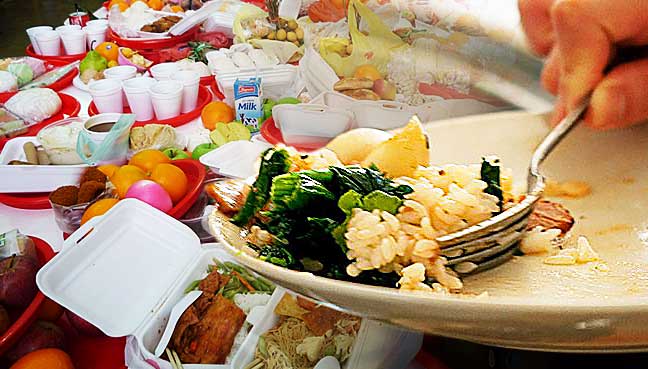Various parties, including ministers, should not just make statements but actually walk the talk in finding a solution to the way food is distributed to the homeless.

KUALA LUMPUR - Food wastage is like a disease for which there is no panacea. Sometimes it flares up, at other times it is manageable.
Food wastage is seasonal with it usually turning more pronounced during the fasting month and festivals.
Ramadan has just ended, we just celebrated Aidilfitri and we are still in the month of Syawal.
Did we learn any valuable lessons throughout Ramadan? By right, we should have learnt a lot. However, year after year, the issue of food waste repeats itself.
As a matter of fact, food is wasted on a daily basis all year round but during the fasting month, the situation is aggravated because that is the time more food stalls mushroom and people end up buying more food than they can possibly eat. It is also the time too many food parcels are donated to the poor and homeless.
This time around, it has been observed that food wastage had hit a peak during the final week of Ramadan when large quantities of untouched food packets were disposed of. Photographs of heaps of uneaten food, in a wink, went viral on social media. Even the mainstream media jumped on the bandwagon to highlight the wastage.
It was distressing to see all that good food ending up in the garbage dump. All those food packets lying amidst the piles of rubbish were actually contributions by various organisations to the homeless people in the Kuala Lumpur metropolitan area.
The contributors had left the food parcels in certain strategic places in the hope of them being picked up by the target group.
Well actually, there is a more courteous way to distribute food to the needy and just leaving the food packets in a so-called convenient place is certainly not the way. Why not make an effort to deliver the food directly to the people who need it?
The photographs that went viral on social media received all kinds of response from netizens, with many of them reiterating the call to set up a body to regulate the distribution of food to the poor and homeless.
If such an organisation is set up, charities and individuals can channel their food contributions to the target groups through this body. This will allow food to be distributed in a more systematic manner, resulting in little or no wastage.
Some social media users also suggested that the food parcels be channelled to the various surau and university students, besides the homeless.
Social activist Syed Azmi Alhabshi has suggested that the donated food also be distributed to policemen and firemen on duty at the various police stations and fire stations, as well as security guards, bus drivers, petrol station attendants and staff of non-governmental organisations (NGOs) conducting tuition or religious classes at night.
Recalling the events of Ramadan 2016, many hotels had collaborated with NGOs to have their surplus food collected from their premises and distributed to the homeless and even residents of the various low-cost People’s Housing Projects (PPR).
Traders at a Ramadan bazaar in Kuala Lumpur also cooperated with an NGO to channel their unsold food to needy groups in the city.
“If you want to give food to the homeless, you must be responsible for it from the start to the end. Even the garbage generated is your responsibility,” a volunteer Fariza Ahmad Yasif said on his Facebook account, where he also posted pictures of heaps of unopened food packets in Kuala Lumpur.
What he said is true. Just donating the food is not enough. Who is going to clean up the garbage after that and dispose of the untouched food?
Based on the social media comments, most people agree that the food donors or distributors should be responsible for cleaning up the place.
Besides the Ramadan period, other festivals and public holidays also see a host of organisations serving food to the homeless and needy communities. While their intentions are good, their efforts can sometimes invite problems like copious amounts of food waste.
What we really need is a more systematic way to distribute food to the target groups. Only then can food waste be curbed.
All kinds of statements regarding the need to check food waste have been issued by various parties, including NGOs, individuals and even ministers.
Instead of merely paying lip service to this issue, they should walk the talk. They don’t have to wait until the next Ramadan.